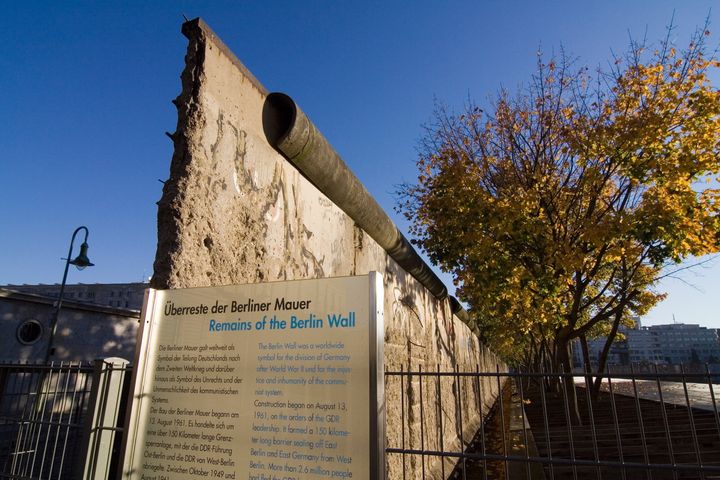
A section of the Berlin Wall that divided west from east until 1989. Photo: Getty Having been in Berlin on that euphoric occasion in November 1989 when the Wall came down, I went on to extensively tour the soon-to-be-abolished East Germany during the following Easter holiday. It was a most interesting time.
Three earlier visits to the divided city that was Berlin during the previous decade told me all I could know about the politically, morally and economically bankrupt totalitarian regime that ran the statelet from 1949 until 1990. The fences, the barbed wire and the emerging tales of state surveillance by the Stasi secret police said almost everything I needed to know. But that Easter holiday trip did teach me about a less-talked-about side of life there.

I remember talking to a young woman who helped run a creche that provided free childcare to all comers, and I learned of her anxiety about changes to the service, already suffering from lack of funds, that to her appeared quite likely. This and other experiences spoke to genuine efforts to build a genuinely people-centred system. I’m reflecting on such things now as Germany faces three critical state elections, starting this weekend, in that old statelet.
People in Thuringia and Saxony vote tomorrow, while the fellow former East German state of Brandenburg will vote on September 22. Polls in all three states show various grievances are pushing many voters to the extremes, both on the left and the right. The expected results are already causing much angst in Berlin about the future of German democracy and the country’s failure to integrate east and west almost 34 years after reunification.
You could call it a warning to advocates of a swift rush to re-uniting Ireland. Almost a quarter-of-a-century after German re-unification, what is the old East Germany still lags seriously behind, and there are distinct tensions about migration, spending to aid Ukraine and continuous EU engagement. There are many who argue that the old DDR remains a country within a country, comparable to Sicily in Italy or Flanders in Belgium.
There is sympathy for Russia, amid claims Washington still dominates German foreign policy These three regional votes are seen as a bellwether for the federal elections due in September next year if the Berlin government can survive ongoing crises. The three-party coalition led by chancellor Olaf Scholz appears paralysed and is unpopular amid divisions with the Social Democrats, the Greens and the Liberals. In these former East German provinces, there is also deep sympathy for Russia, rooted in persistent anti-Americanism, amid claims Washington still dominates German foreign policy and is thus leading the country astray.
The far-right AfD argues in favour of pulling Germany out of the various manifestations of the West, including the EU and Nato. Some AfD election posters show the German and Russian flags commingled, with the slogan “The East does it” or “The East is rising”. These elections are expected to show the persistent divisions in politics and social attitudes between western and eastern Germany.
But AfD success is changing the political debate nationwide, especially around issues such as migration and support for Ukraine. On August 23, there was a knife attack in the western city of Solingen, where prosecutors say a Syrian refugee killed three people and wounded eight. The AfD and a new breakaway far-left party, Sahra Wagenknecht Alliance, want strong controls on illegal migration, deporting those who do not qualify for asylum, such as the Syrian man accused of these crimes.
That has pushed Chancellor Scholz of the Social Democrats, which has lost many voters in the east, to vow to step up deportations and call for tougher EU laws on asylum and deportation. The issues of refugees, migration and knife crimes have added to the sense of estrangement in the east. But the attitudes, experiences and language bred over 40 years of East German sovereignty, passed down generation to generation,remain for many a source of identity and pride.
Join the Irish Independent WhatsApp channel Stay up to date with all the latest news.














